

Siddhartha Gunti
September 09, 2024
Interviewing candidates for ITIL roles requires a structured approach to identify individuals who can effectively manage IT services. Having a well-prepared list of ITIL interview questions can help you streamline this process and ensure you cover all necessary topics, much like understanding the skills required for an IT manager.
This blog post will provide you with a comprehensive list of ITIL interview questions, specifically tailored to different levels of expertise and various aspects of ITIL processes and implementation. You'll find questions for junior specialists, situations and scenarios to hire top specialists, and inquiries concerning processes and implementation.
By utilizing this list, you can better evaluate your candidates' knowledge and practical skills, ensuring you make informed hiring decisions. Additionally, consider leveraging our ITIL Online Test to pre-screen your applicants before conducting interviews.
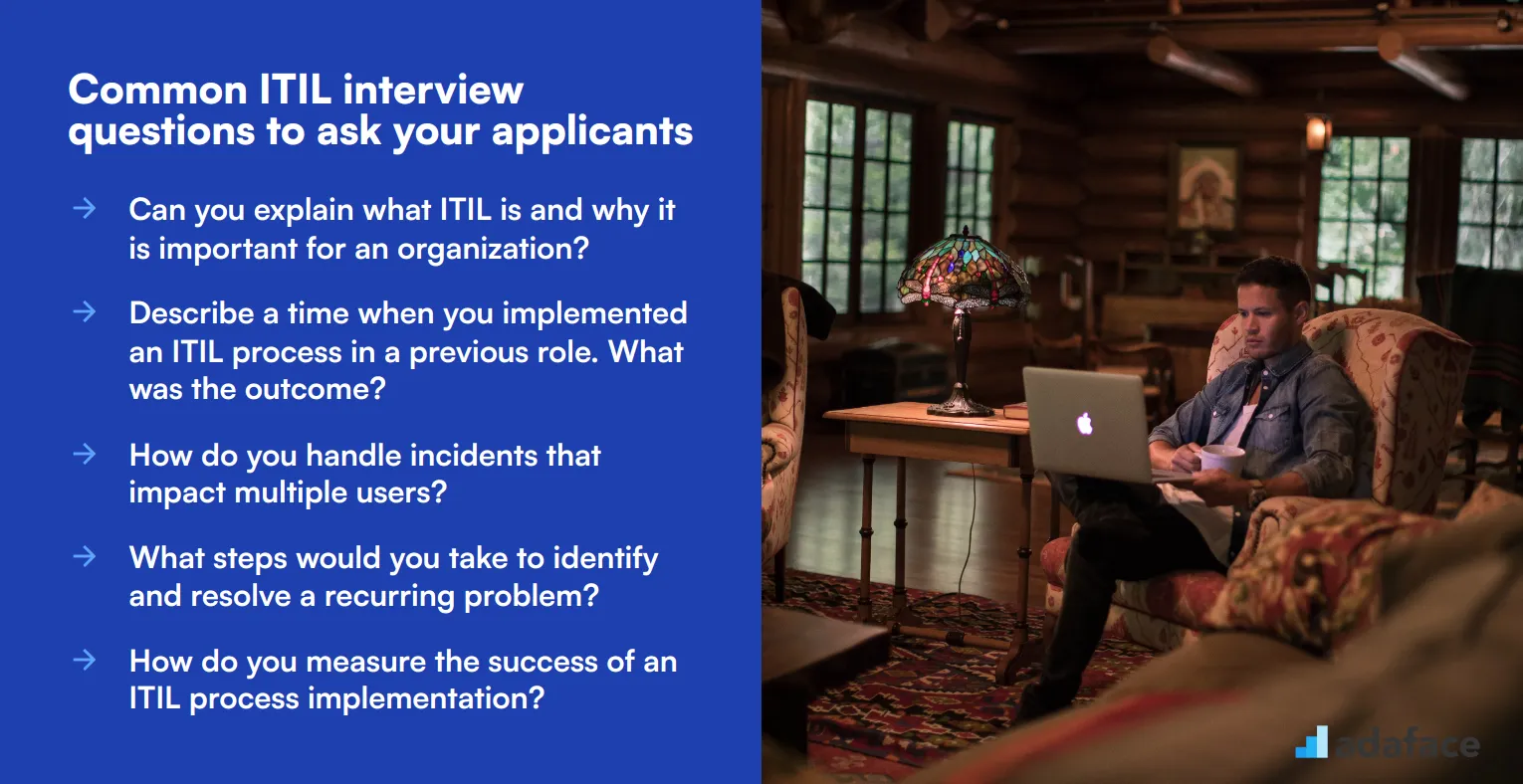
To ensure you hire the right candidate for your ITIL-related role, it’s important to ask targeted questions during the interview. Use these questions to gauge the applicant’s understanding and practical knowledge of ITIL principles. For more details on IT roles, you can refer to IT manager job description.
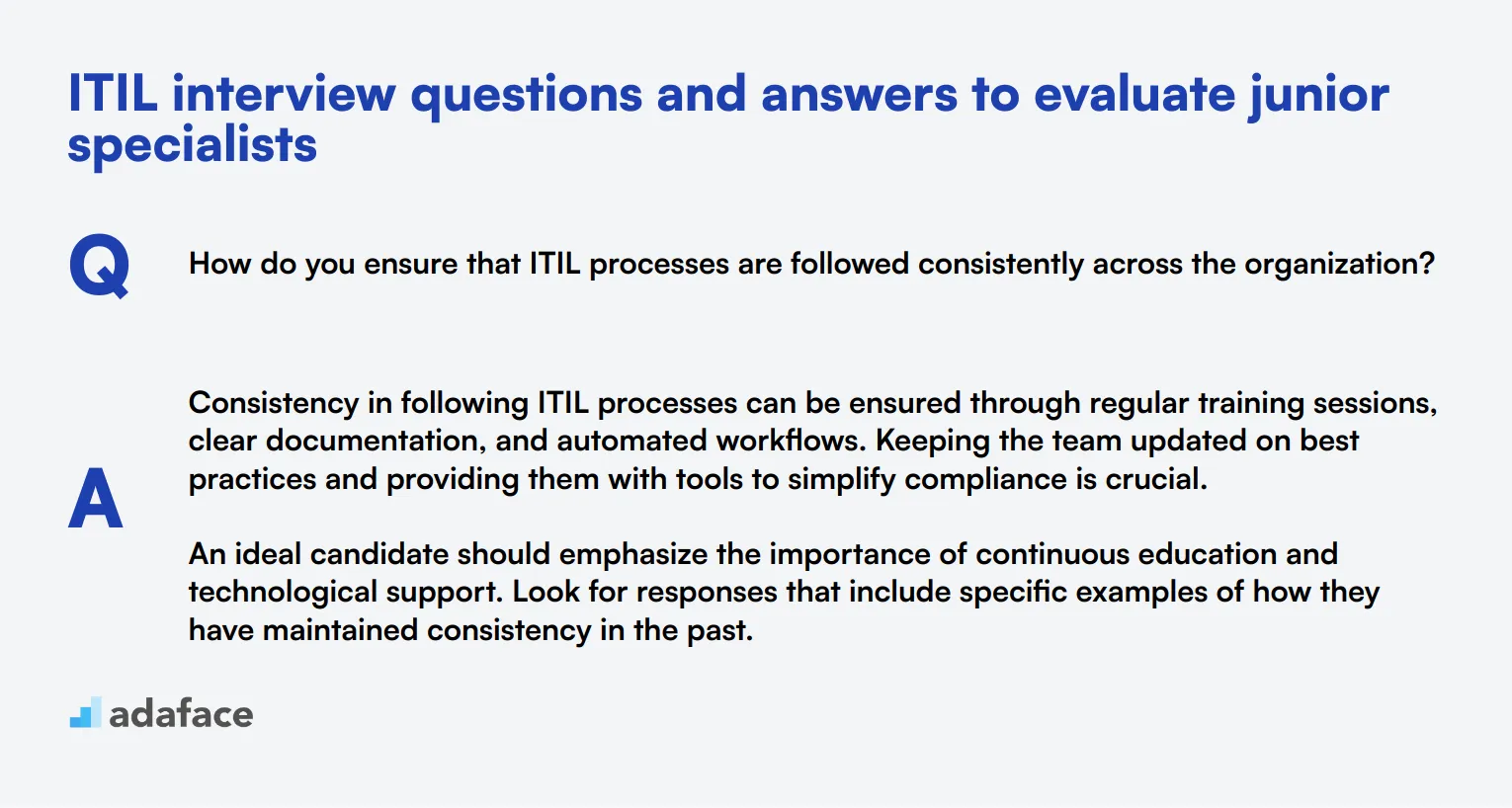
When evaluating junior ITIL specialists, it's essential to ask questions that reveal their understanding of ITIL fundamentals and their ability to apply these concepts in real-world scenarios. Use these questions to dig deeper into their knowledge and practical experience, ensuring you find the right fit for your team.
Consistency in following ITIL processes can be ensured through regular training sessions, clear documentation, and automated workflows. Keeping the team updated on best practices and providing them with tools to simplify compliance is crucial.
An ideal candidate should emphasize the importance of continuous education and technological support. Look for responses that include specific examples of how they have maintained consistency in the past.
Handling non-compliance starts with understanding the reasons behind it. I would first have a one-on-one conversation to understand their perspective. Based on the discussion, I would offer retraining or additional resources if needed.
A strong candidate should show empathy and problem-solving skills, focusing on constructive feedback and support rather than punitive measures.
I stay updated by attending industry conferences, participating in webinars, and subscribing to ITIL-related publications. Networking with other professionals and joining relevant forums also helps in staying current.
Look for candidates who demonstrate a commitment to continuous learning. They should be proactive in seeking out new information and implementing it in their work.
Balancing adherence and flexibility involves setting clear priorities and understanding the impact of deviations. I emphasize core processes that must be followed while allowing some flexibility for less critical tasks.
The best responses will show a nuanced understanding of when to be strict and when to allow flexibility. Candidates should give examples of how they have successfully managed this balance in past roles.
Effective communication can be ensured through regular meetings, clear documentation, and using collaboration tools. It's important to make sure that everyone understands their roles and responsibilities.
Candidates should highlight their ability to use various communication methods effectively. They should provide examples of how they've ensured clarity and alignment within their team.
In cases where ITIL processes conflict with business requirements, I prefer to engage in discussions with stakeholders to find a compromise. The goal is to align ITIL practices with business objectives without compromising on quality.
Candidates should illustrate their problem-solving and negotiation skills. Ideal answers will show a balanced approach that respects both ITIL processes and business needs.
I encourage team members by fostering an open culture where feedback is valued. Incentives for suggestions and regular brainstorming sessions can also motivate them to contribute.
Seek candidates who prioritize team engagement and continuous improvement. They should be able to provide specific examples of successful initiatives they've led.
Measuring effectiveness involves setting clear KPIs and regularly reviewing performance against these metrics. Feedback from stakeholders and periodic audits also help in assessing adherence.
Candidates should mention specific metrics they have used in the past and how they have acted upon the results to drive improvements. Look for a data-driven approach.
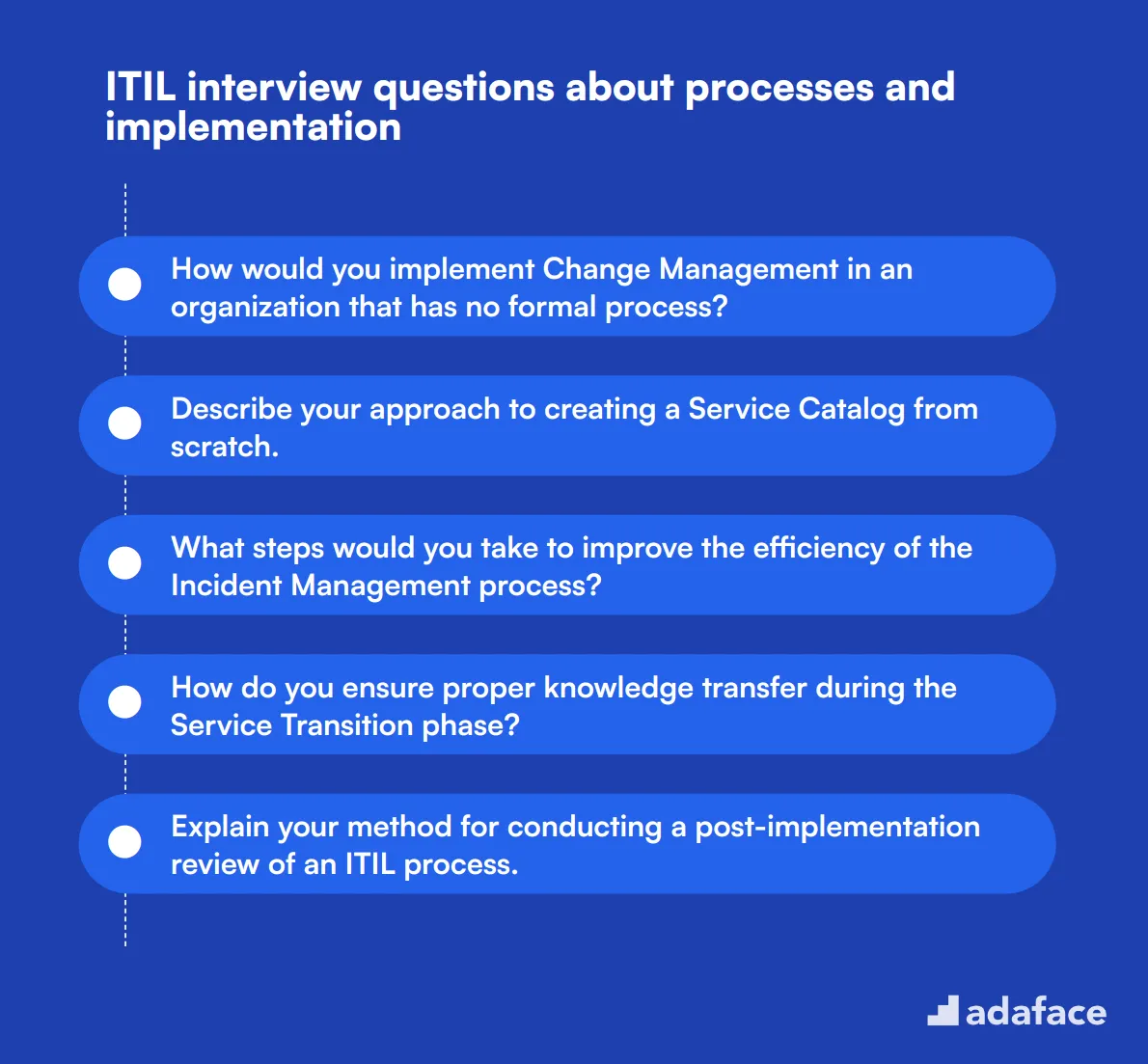
To assess candidates' practical understanding of ITIL processes and implementation, use these interview questions. They help evaluate an applicant's ability to apply ITIL principles in real-world scenarios, crucial for roles like IT Manager or Incident Manager.
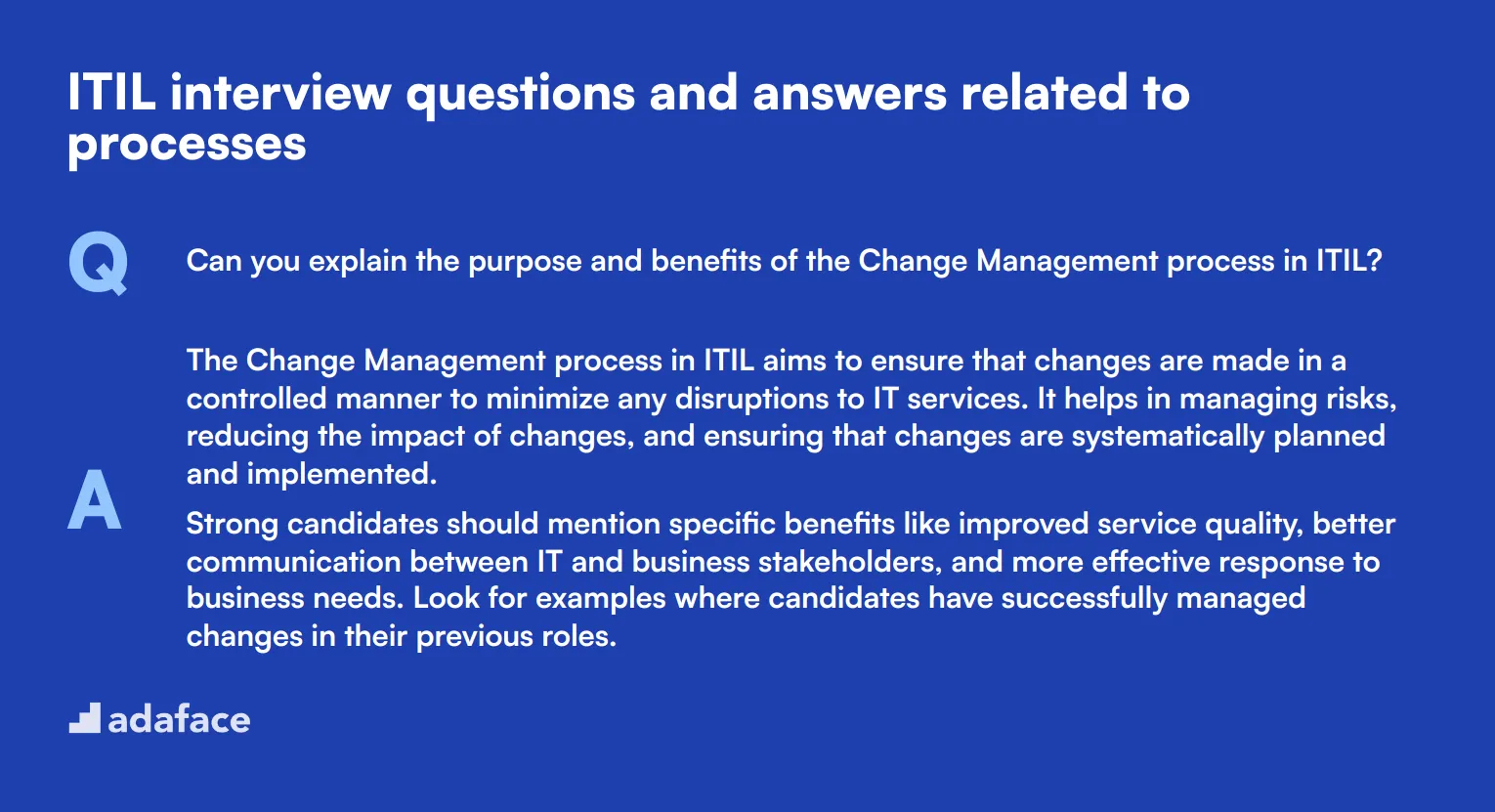
To determine if your candidates possess a solid understanding of ITIL processes, consider using these tailored interview questions. They will help you evaluate how well applicants can manage and improve ITIL processes within your organization.
The Change Management process in ITIL aims to ensure that changes are made in a controlled manner to minimize any disruptions to IT services. It helps in managing risks, reducing the impact of changes, and ensuring that changes are systematically planned and implemented.
Strong candidates should mention specific benefits like improved service quality, better communication between IT and business stakeholders, and more effective response to business needs. Look for examples where candidates have successfully managed changes in their previous roles.
The Service Operation stage focuses on the day-to-day activities and processes to manage and deliver IT services efficiently. Key activities include incident management, event management, request fulfillment, problem management, and access management.
Candidates should be able to elaborate on how these activities contribute to maintaining service quality, resolving issues quickly, and ensuring user satisfaction. Look for candidates who can provide examples of how they have managed these activities in real-world scenarios.
Service Strategy is about defining the perspective, position, plans, and patterns that a service provider needs to execute to meet an organization's business outcomes. Service Design, on the other hand, involves the design of new or changed services for introduction into the live environment.
An ideal candidate will explain that Service Strategy provides the overall direction and objectives, while Service Design translates these strategies into specifications and plans for creating or modifying services. Look for candidates who can discuss how they have aligned these stages in their previous roles.
The primary objective of Continual Service Improvement (CSI) is to consistently enhance the efficiency and effectiveness of IT services and processes. It involves identifying and implementing improvements to processes, services, and infrastructure.
Candidates should discuss specific methods like the Deming Cycle (Plan-Do-Check-Act), setting measurable targets, and analyzing performance data. Look for candidates who can provide examples of improvements they have successfully implemented in their previous roles.
Effective communication during the Service Transition phase is critical to ensure that all stakeholders are informed about changes, new services, and any potential impacts. This can be achieved through regular meetings, clear documentation, and robust communication plans.
Candidates should mention the importance of involving stakeholders early, using multiple communication channels, and ensuring that messages are clear and concise. Look for examples of how they have managed communication in previous transitions.
The Configuration Management Database (CMDB) is a central repository that contains information about all the components of an IT system, including hardware, software, and documentation. It helps in understanding relationships between different components and managing changes effectively.
Strong candidates should explain how a CMDB supports decision-making, improves incident and problem management, and enhances compliance with regulatory requirements. Look for candidates who have experience in setting up or maintaining a CMDB.
Identifying and managing risks involves conducting risk assessments, analyzing potential impacts, and implementing mitigation strategies. It's essential to engage stakeholders and continuously monitor for new risks.
Candidates should discuss methods like SWOT analysis, risk registers, and risk mitigation plans. Look for examples where they have successfully identified and managed risks in previous projects.
An effective Service Level Agreement (SLA) should include clear definitions of the services provided, performance metrics, responsibilities of both parties, and consequences of not meeting the agreed levels. It should be specific, measurable, and achievable.
Candidates should emphasize the importance of aligning SLAs with business objectives and regularly reviewing them to ensure they remain relevant. Look for candidates who have experience in drafting or managing SLAs.
Continuous improvement in ITIL processes can be achieved through regular audits, feedback mechanisms, training programs, and performance metrics. It's crucial to foster a culture of improvement within the organization.
Candidates should discuss techniques like the Deming Cycle, root cause analysis, and benchmarking against industry standards. Look for examples of how they have driven continuous improvement in their previous roles.
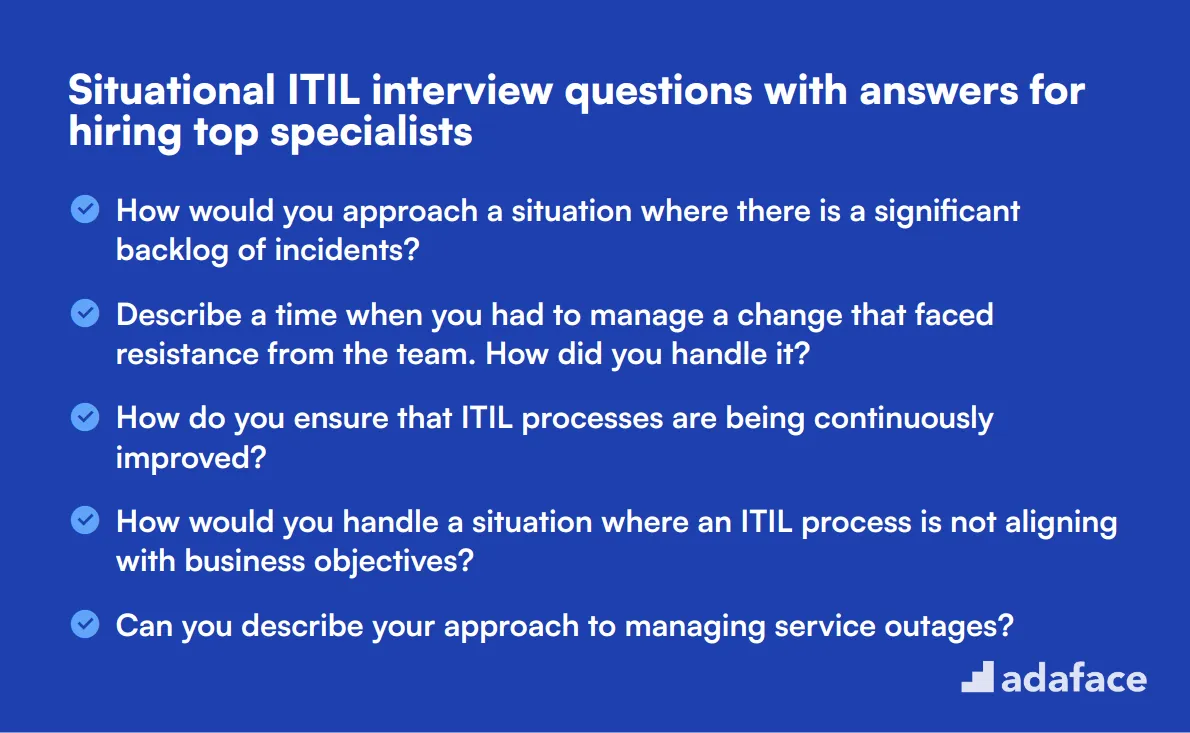
When you're in the hot seat of interviewing for top ITIL specialists, having a list of situational questions can be your secret weapon. These questions will help you uncover candidates' practical knowledge and problem-solving abilities, ensuring you bring the best on board.
To tackle a significant backlog of incidents, I would first prioritize the incidents based on their urgency and impact. This involves categorizing the incidents into critical, high, medium, and low priority. Critical incidents that affect business operations or a large number of users would be addressed first.
Next, I would gather a dedicated team to focus on resolving high-priority incidents. This team would be briefed on the current status and expected outcomes. Communication with stakeholders would be key to keep everyone informed about the progress and any potential delays.
A strong candidate should demonstrate a structured approach to incident management, including prioritization, team coordination, and effective communication. Look for candidates who emphasize stakeholder communication and continuous monitoring.
In my previous role, we introduced a new change management process which faced resistance from the team due to the perceived increase in workload. To address this, I organized a series of workshops to explain the benefits of the new process and how it would streamline their tasks in the long run.
I also sought feedback from the team and made some adjustments to the process based on their input. This not only improved the process but also made the team feel valued and heard.
An ideal candidate should show experience in managing change, including handling resistance effectively. Look for examples of how they communicated benefits, engaged the team, and incorporated feedback.
Continuous improvement in ITIL processes can be ensured by adopting the Deming Cycle (Plan-Do-Check-Act). This involves regular review meetings to assess the current processes and identify areas for improvement. Feedback from team members and stakeholders is crucial in this step.
I would also implement key performance indicators (KPIs) to measure the effectiveness of processes and use these metrics to drive improvements. Regular training sessions and workshops can help keep the team updated with the latest best practices.
Look for candidates who emphasize the importance of feedback, metrics, and regular training. These elements are critical for fostering a culture of continuous improvement.
If an ITIL process is not aligning with business objectives, the first step is to identify the specific misalignment. This usually involves discussions with business leaders and stakeholders to understand their objectives and how the current ITIL process is falling short.
Based on this understanding, I would work on modifying the ITIL process to better align with business goals. This could involve tweaking the process steps, redefining SLAs, or integrating additional tools.
An exceptional candidate should highlight their problem-solving skills and experience in aligning ITIL processes with business goals. Look for examples where they successfully navigated similar challenges.
Managing service outages requires a clear and efficient incident management process. My approach involves immediate incident logging and categorization, followed by assigning the incident to the relevant team for quick resolution. Communication with affected users is crucial to keep them informed about the status and expected resolution time.
Post-resolution, I conduct a root cause analysis to understand the underlying issue and implement preventive measures to avoid recurrence. Documentation and communication of the findings to stakeholders are also essential steps.
Candidates should demonstrate a structured approach to incident management, including rapid response, effective communication, and thorough root cause analysis. Look for mentions of preventive measures and stakeholder communication.
If an ITIL project is falling behind schedule, the first step is to identify the root cause of the delay. This could involve resource constraints, process inefficiencies, or unforeseen challenges. Once identified, I would develop an action plan to address these issues, which could include reallocating resources, adjusting timelines, or introducing additional support.
Regular progress meetings would be scheduled to monitor the project's status and make any necessary adjustments. Communication with stakeholders to manage expectations and keep them informed is also crucial.
Look for candidates who can pinpoint the cause of delays and have a proactive approach to resolving them. They should also emphasize the importance of communication and stakeholder management.
Effective knowledge management within an ITIL framework involves creating a centralized knowledge base where all relevant information is documented and easily accessible. This can include process documentation, incident reports, and best practices.
Regular updates and reviews of the knowledge base ensure that the information remains current and accurate. Additionally, fostering a culture where team members are encouraged to contribute to the knowledge base is crucial for its success.
Candidates should highlight their experience in building and maintaining knowledge bases, as well as their strategies for ensuring ongoing contributions and updates. Look for examples of how they have successfully implemented knowledge management practices in the past.
While it's impossible to gauge every aspect of a candidate's capabilities in a single interview, focusing on a few key ITIL-specific skills can give you a clearer picture of their potential fit. Here are the fundamental skills to assess during the ITIL interview phase.
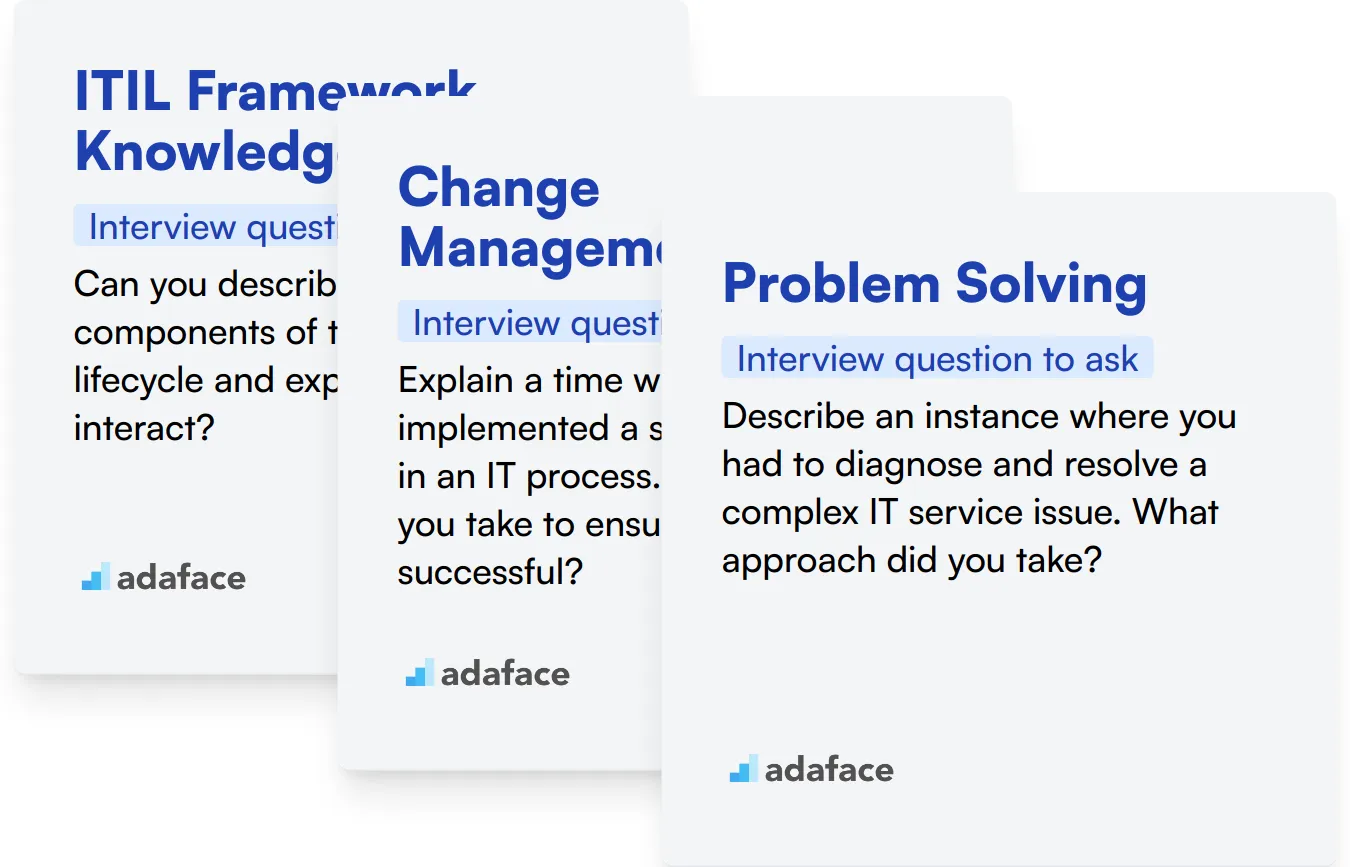
Understanding the ITIL framework is fundamental for any ITIL role. A candidate with a solid grasp of ITIL's principles, practices, and terminologies is better equipped to align IT services with business needs.
Consider using an assessment test that includes multiple-choice questions (MCQs) to verify candidates' knowledge of the ITIL framework. While we don't have a specific test focused solely on ITIL framework knowledge, our ITIL Online Test can be an effective tool to assess this skill.
To evaluate their practical understanding, you might ask:
Can you describe the key components of the ITIL service lifecycle and explain how they interact?
Look for responses that clearly outline the five stages of the lifecycle: Service Strategy, Service Design, Service Transition, Service Operation, and Continual Service Improvement. A good answer will include not only definitions but examples of how these components work together.
Change management is critical in ITIL to ensure that standard procedures are used for efficient and prompt handling of all changes. This minimizes the impact of change-related incidents on service quality, and consequently on business operations.
You might assess this ability by asking:
Explain a time when you implemented a significant change in an IT process. What steps did you take to ensure it was successful?
Effective answers should detail steps that align with ITIL practices, such as assessing risks, planning, seeking authorization, testing, and reviewing post-implementation. The candidate should also demonstrate an understanding of how their actions influenced business outcomes.
In ITIL roles, the ability to troubleshoot and resolve issues efficiently is imperative. This skill ensures that the candidate can manage incidents and problems in ways that minimize disruption to business operations.
To delve into their problem-solving skills, consider asking:
Describe an instance where you had to diagnose and resolve a complex IT service issue. What approach did you take?
Look for detailed methodologies and a structured approach to problem-solving. Key elements include identifying the problem, analyzing potential causes, devising and implementing a solution, and reviewing the incident to prevent future issues.
As you prepare to implement what you've learned, consider these practical tips to enhance your ITIL interview process.
Using skills tests before interviews helps filter candidates based on their actual abilities rather than just their resumes. This process can significantly reduce the time spent interviewing unqualified candidates.
Consider utilizing tests such as the ITIL online test to evaluate a candidate's knowledge of ITIL principles. Other relevant assessments like the problem-solving test can provide deeper insights into their analytical skills.
Conducting these tests prior to interviews allows you to focus your questions on candidates who possess the necessary skills, thereby improving the overall quality of the interview process.
Time is limited during interviews, making it crucial to select the most relevant questions that assess key competencies. This targeted approach maximizes your ability to evaluate candidates on important aspects of their skill set.
In addition to ITIL-specific questions, consider including inquiries related to communication or problem-solving skills to gain a well-rounded view of the candidate's capabilities.
By focusing on a balanced set of questions, you can streamline the interview process and enhance your ability to identify the best-fit candidates.
Simply relying on pre-set interview questions may not yield comprehensive insights into a candidate's depth of knowledge. Follow-up questions can reveal whether candidates possess a genuine understanding or are merely providing surface-level answers.
For example, if a candidate states they have experience with ITIL incident management, a good follow-up might be, 'Can you describe a specific incident you managed and the steps you took?' This question helps you gauge their hands-on experience and problem-solving approach.
If you aim to hire someone with ITIL skills, it’s important to validate their expertise accurately. The best way to do this is through skills tests like the ITIL online test.
After utilizing this test, you can effectively shortlist the best applicants for interviews. To get started, consider signing up on our online assessment platform to streamline your hiring process.
The ITIL (Information Technology Infrastructure Library) Online Test uses scenario-based multiple choice questions to evaluate candidates on their knowledge and understanding of ITIL, service strategy, service design, service transition, service operation, and continual service improvement. The test aims to determine candidates' ability to apply ITIL principles and practices to real-world scenarios, as well as their familiarity with ITIL terminology, concepts, and processes.